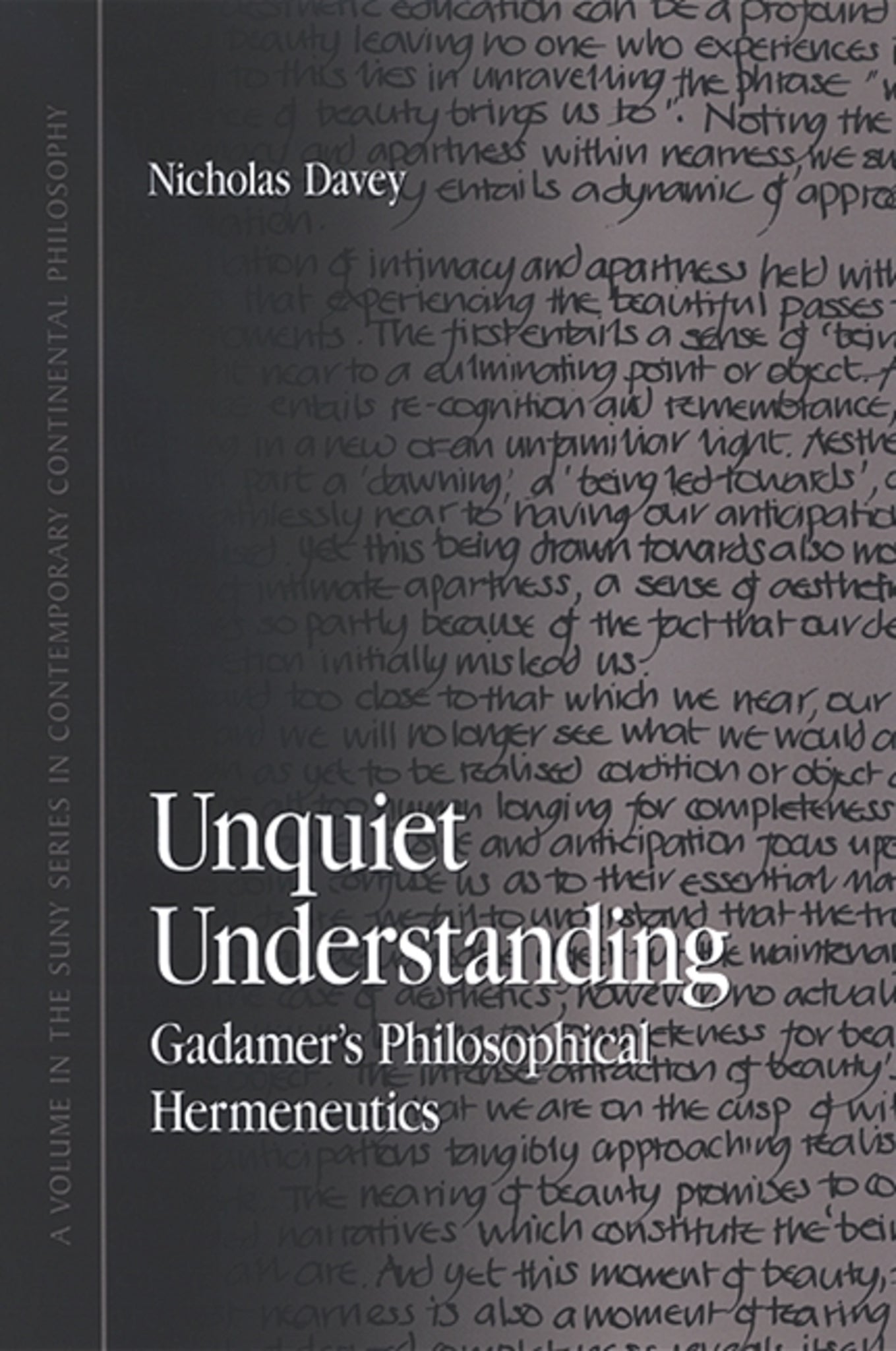We're sorry. An error has occurred
Please cancel or retry.
Unquiet Understanding

Some error occured while loading the Quick View. Please close the Quick View and try reloading the page.
Couldn't load pickup availability
- Format:
-
08 September 2006

Argues that Gadamer's philosophical hermeneutics merits a radical reappraisal.
In Unquiet Understanding, Nicholas Davey reappropriates the radical content of Gadamer's philosophical hermeneutics to reveal that it offers a powerful critique of Nietzsche's philosophy of language, nihilism, and post-structuralist deconstructions of meaning. By critically engaging with the practical and ethical implications of philosophical hermeneutics, Davey asserts that the importance of philosophical hermeneutics resides in a formidable double claim that strikes at the heart of both traditional philosophy and deconstruction. He shows that to seek control over the fluid nature of linguistic meaning with rigid conceptual regimes or to despair of such fluidity because it frustrates hope for stable meaning is to succumb to nihilism. Both are indicative of a failure to appreciate that understanding depends upon the vital instability of the "word." This innovative book demonstrates that Gadamer's thought merits a radical reappraisal and that it is more provocative than commonly supposed.


"…[an] excellent book … Davey's exposure of the subversive, provocative, and conflictive character of hermeneutics remains the most innovative aspect of his text." — Symposium
"In Nick Davey, Gadamer's legacy finds a powerful advocate, who is similarly ready to distance himself from his subject, and his writings, in order the better to reconstruct their conceptual possibility, and thereby to provide the stronger account of what is philosophically distinctive in Gadamer's reinvention of hermeneutics … [a] fine book…" — British Journal of Aesthetics
"This is the most enlightening introduction available to Gadamer's philosophical hermeneutics. It redefines transcendence and translation in hermeneutical terms, but it goes substantially beyond this to offer an introduction to many other topics in philosophical hermeneutics." — Richard E. Palmer, coeditor of Dialogue and Deconstruction: The Gadamer-Derrida Encounter
"Elegantly written, this book provides an engaging, original, and challenging reading of Gadamer's hermeneutics. Davey offers an insightful clarification of the nature and specific contribution of hermeneutics as well as a revealing description of the wantonness of understanding." — Jean Grondin, author of Sources of Hermeneutics
Preface
Acknowledgments
1. Philosophical Hermeneutics:Navigating the Approaches
IntroductionEleven Theses on Philosophical Hermeneutics
Thesis One:Hermeneutical Understanding Requires Difference
Thesis Two:Philosophical Hermeneutics Promotes Philosophy of Experience
Thesis Three:Philosophical Hermeneutics Entails an Commitment to Hermeneutic Realism
Thesis Four:Philosophical Hermeneutics Seeks Otherness within the Historical
Thesis Five:Philosophical Hermeneutics Reinterprets Transcendence
Thesis Six:Philosophical Hermeneutics Entails Ethical Disposition
Thesis Seven:Hermeneutic Understanding Redeems the Negativity of Its Constituting Differential
Thesis Eight:Philosophical Hermeneutics Affirms an Ontology of the In-between
Thesis Nine:Philosophical Hermeneutics Is Philosophical Practice Rather Than a Philosophical Method
Thesis Ten:Philosophical Hermeneutics Is a Negative Hermeneutics
Thesis Eleven:Philosophical Hermeneutics Looks upon Linguistic Being as a "Mysterium"
Conclusion:Philosophical Hermeneutics and the Question of Openness
2. Philosophical Hermeneutics and Bildung
Introduction
Bildung as a Transformative and Formative Process
Bildung and Tradition
Bildung and the Question of Essence
Bildung and the In-between
Bildung and Hermeneutical Practice
Bildung and Subject Matter (Die Sache selbst)
Sachen as a Totality of Meaning
Die Sachen and Negative Dialectics
Die Sachen and Plato’s Forms
Sachen, Cultural Communities, and Cortesia
"Bildung" and the Question of Nihilism
Conclusion
3. Intimations of Meaning:Philosophical Hermeneutics and the Defense of Speculative Understanding
What Is Speculative Thinking?
The Formal Elements of Speculative Thought
The Speculative Motion of Hermeneutic Experience
The Defense of Speculative Understanding
The Speculative and the Humenistic
Speculative Insight and the "Unfounding" of Experience
Language and the Dialectic of Speculative Experience
Nietzsche, Philosophical Hermeneutics, Language, and the Market Place.
Entr’acte
4. Understanding’s Disquiet
The Wantonness of Understanding
Four Responses to Deconstructive Criticism
Philosophical Hermeneutics and the Question of Alterity
Nihilism and the Life of Understanding
Dialogue and Dialectic
Language, Ideas, and Sachen
Keeping the Word in Play
Choice Words
The Poise of the In-between
The Giving Word
Language and Withouteness
Language Negation and Affirmation:A Resumé
The Open and the Empty
Understanding and the Disquieting of the Self
Di-alogue and Di-stance
Afterword
Notes
Bibliography
Index



